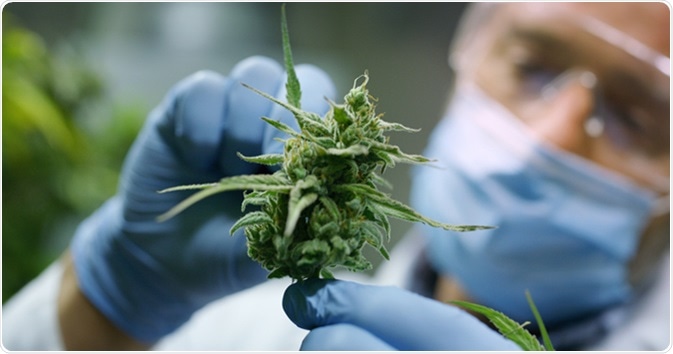Both cannabidiol (CBD) and Δ-9-tetrahydrocannabinol (THC) are found in cannabis and are the best investigated cannabinoids. However, there are significant differences between them with regards to potency.

Scientist checking hemp plants. Image Credit: HQuality / Shutterstock
How does THC differ from CBD in cognitive effects?
THC is the chief psychoactive component of the herb cannabis. It can be ingested, taken sublingually, applied topically, inhaled as vapor, smoked, mixed into food, used in tea and has even been used intravenously for research. It binds to cannabinoid receptors in the brain, leading to psychiatric effects, such as cognitive problems, as well systemic consequences, such as tachycardia.
Acute cognitive problems may be more common with THC, including verbal learning difficulty, working memory and emotional processing. On the other hand, CBD may improve cognitive function (including memory) in individuals who use cannabis, but not in persons with neurological or psychiatric disorders.
There are also some signs that some acute cognitive issues (like emotional processing and working memory, but not attention) might be averted by a combination of THC with CBD in neuropsychiatric patients as well. Memory intrusions are still persistently present even with pretreatment by CBD followed by THC administration, but delayed verbal memory recall is not present with this combination.
Are the psychoactive effects different with THC and CBD?
Psychoactive effects are proportional in incidence to the concentrations of THC and inversely proportional to those of CBD. This is important in that many newer cultivars have increasing THC concentrations and lower CBD levels, compared to earlier varieties of cannabis. Thus, newer studies may show greater cognitive impairment among long-term cannabis users, because of this change in the relative proportions. Chronic use of cannabis with high THC, low CBD concentrations could cause verbal and episodic memory impairment.
Sound intensity is perceived differently from other people. Severe psychiatric symptoms are seen with high doses of THC in schizophrenia, including hallucinations and delusions, as well as resistant psychosis, which cannot be treated using ordinary antipsychotic drugs. Normally, THC produces some anxiety, which can become generalized and unreasonable in severe cases.
THC is active when used to alleviate the morphine withdrawal syndrome. In contrast, an equal dose of CBD showed lack of effect.
This experimental evidence is supported by imaging studies, which show acute changes caused by THC and CBD in brain areas responsible for these functions.
- THC attenuates activity in certain brain areas during a response inhibition task, but the opposite is true with CBD.
- Other areas of brain connectivity and processing are also found to be affected in opposite ways by THC and CBD.
- Visual processing is increased in the primary visual cortex, but attenuated in the occipital cortex, while CBD increases it occipitally. Cerebellar activity is also opposite following exposure to THC and CBD during visual processing.
- On the other hand, with auditory stimulus processing, THC reduces activity in the auditory cortex compared to CBD.
Pain relief
There is not much difference in the degree of pain relief with either THC or CBD, vs placebo.
Do THC or CBD have anti-inflammatory action?
Both THC and CBD reduce the rate of production and release of proinflammatory cytokines from microglial cells exposed to bacterial lipopolysaccharide. However, CBD also reduces the activity of the NF-KB pathway, which is important in regulating the transcription of genes involved in inflammation. In addition, it increases the level of activity of STAT3, a transcription factor that tends to revert the body to the anti-inflammatory state. These actions are not seen with THC.
Do THC or CBD affect anxiety?
THC and CBD have opposing actions when it comes to fear processing in the amygdala and other related brain regions. THC increases feelings and symptoms of anxiety and autonomic arousal, while the reverse is true with CBD, making it an anxiolytic.
Interactions
CBD inhibits the metabolism of THC causing the levels of the latter to go up, in some rat studies. THC was found to be present in the blood and brain of rats to whom only CBD was administered. While THC caused complete immobility in rats, oral CBD resulted in only mild hyperlocomotion. However, there was not much effect on THC-induced behavior as a result of CBD administration.
Summary
There is a small, but suggestive body of evidence, which needs to be followed up to prove that CBD pretreatment or co-administration could prevent many of the effects of THC administration on cognitive function in humans. This research could help define the optimal THC/CBD ratio at which the drug becomes beneficial to the user in various disease conditions, both physical and neuropsychiatric conditions.
Cannabidiol (CBD) and Tetrahydrocannabinol (THC)
Further Reading
Last Updated: Mar 5, 2019